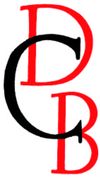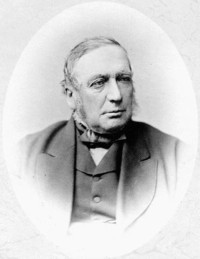CORBY, HENRY, distiller, businessman, and politician; b. in 1806 at Hanwell (now part of Greater London), England, son of James Corby; d. 25 Oct. 1881 at Belleville, Ont.
Henry Corby, after serving as an apprentice to a baker in London, married Alma Williams in 1832 and immigrated to Belleville, Upper Canada. With a small amount of capital, he invested in merchandise, operated a small general store, and by 1838 had established a bakery. He had accompanied the Hastings Rifle Brigade on patrol during the rebellion in Upper Canada in December 1837, and he procured a profitable contract to supply local troops with provisions. The contract was extended through 1838 and the bakery also flourished, but Corby suddenly disposed of his enterprises after the tragic drowning of his wife and two of their three children on 27 Dec. 1838. He then purchased the lake steamer Queen and became involved in the forwarding trade, buying and selling grain at ports from Belleville to Kingston. In 1842 he sold the vessel and returned to Belleville where he continued to market grain. The same year he married his late wife’s sister, Matilda; they were to have 12 children.
Planning to establish a new milling operation, Corby in 1855 purchased Salyer Reed’s grist-mill located north of Belleville at Hayden’s Corner (the name was changed to Corbyville in 1882), and he added a distillery four years later. During his ownership the milling activity remained the dominant part of the business. The local demand for whisky led to the establishment of the distillery but its annual production was comparatively low and it did not compete with other distilleries such as that of Gooderham and Worts [see William Gooderham Sr]. The business remained essentially a family enterprise; Henry Jr, George, and Edward all joined their father in the firm.
By 1840 Corby had developed a lasting interest in municipal politics. He had been a member of Belleville’s first police board in 1839 and was a village councillor from 1842 to 1847 and again in 1849. He also served both as reeve of Belleville and as a councillor from 1857 to 1860; he was re-elected to the latter post in 1862. Having acquired a large amount of experience in municipal affairs, Corby ran for mayor of Belleville in 1863 but was defeated by James Brown, who was to become the federal member for Hastings West in 1867. Corby was not discouraged from participating in public events; in 1865 he was among five founding directors, including Mackenzie Bowell*, appointed to the local board of trade. He was elected mayor of Belleville in 1867 and again the following year.
Corby’s popularity was evident. As an independent Conservative, he was elected the first member for the Ontario legislature in Hastings East in 1867, and enjoyed two consecutive terms of office, sitting from 1867 to 1875. In the assembly, Corby supported Stephen Richards*’ land grant policy in 1868 and helped persuade the government to establish the Ontario School for the Deaf which opened on 20 Oct. 1870 at Belleville. He was also a long-time promoter and director of the Grand Junction Railway which was to run from Belleville through Peterborough to Toronto, and he assisted in securing a charter in 1871 for its construction. In 1874 he supported the act of incorporation for the Belleville and North Hastings Railway which amalgamated with the Grand Junction five years later. Corby retired from public life in 1875 because of failing health.
He then devoted time to his milling and distillery business. In 1876, after the death of his second wife, he married Isabel Metcalfe of Kingston. He continued to be active in business affairs and such fraternal organizations as the Sons of England and the St George’s Society until August 1881 when his health finally collapsed; he then sold the distillery, the mills, and a wine importing business to his son Henry for $10,000. It was Henry Jr’s modernization of the business which helped it attain a prominent position in the distilling industry around the world.
AO, MU 470, A. A. Campbell to Alexander Campbell, 8 Jan. 1872. Belleville Public Library (Belleville, Ont.), Hastings County Hist. Soc. Arch., Henry Corby, files 210-1, 916, 916-1, 917, 919-22, 924-27. Corby Distilleries Limited (Corbyville, Ont.), Henry Corby file. Ont., Legislative Library, Newspaper Hansard, 1874 (mfm. at AO). PAC, MG 26, E14; F; MG 29, D61. Intelligencer (Belleville), 1862–73. Weekly Intelligencer (Belleville), 27 Oct. 1881. Directory of the county of Hastings . . . (Belleville), 1859–60: 73, 158, 185. G. E. Boyce, Historic Hastings (Belleville, 1967). William Canniff, History of the settlement of Upper Canada (Ontario), with special reference to the Bay Quinté (Toronto, 1869; repr. as The settlement of Upper Canada, intro. D. W. Swainson, Belleville, 1971), 493, 496. W. C. Mikel, City of Belleville history (Picton, Ont., 1943), 25–30, 50–53. W. F. Rannie, Canadian whisky; the product and the industry (Lincoln, Ont., 1976), 125–30.
© 1982–2024 University of Toronto/Université Laval
Image Gallery

Cite This Article
David M. Calnan, “CORBY, HENRY,” in Dictionary of Canadian Biography, vol. 11, University of Toronto/Université Laval, 2003–, accessed April 24, 2024, http://www.biographi.ca/en/bio/corby_henry_11E.html.
The citation above shows the format for footnotes and endnotes according to the Chicago manual of style (16th edition). Information to be used in other citation formats:
| Permalink: | http://www.biographi.ca/en/bio/corby_henry_11E.html |
| Author of Article: | David M. Calnan |
| Title of Article: | CORBY, HENRY |
| Publication Name: | Dictionary of Canadian Biography, vol. 11 |
| Publisher: | University of Toronto/Université Laval |
| Year of publication: | 1982 |
| Year of revision: | 1982 |
| Access Date: | April 24, 2024 |










